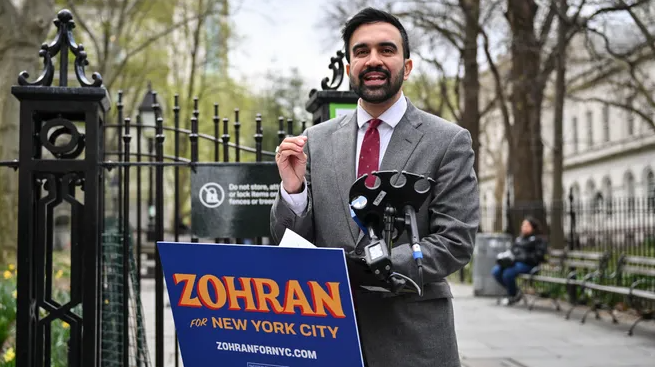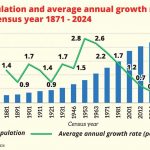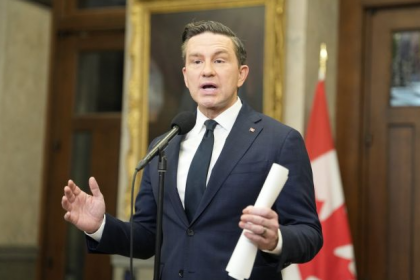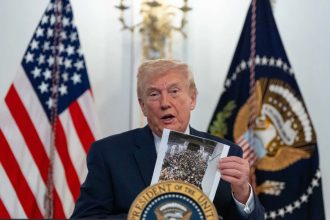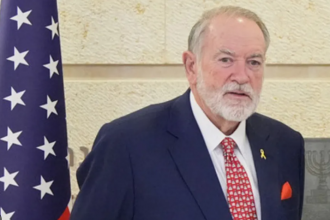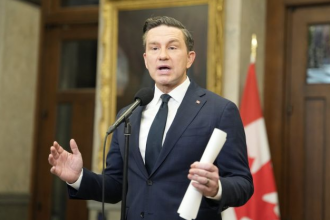NEWYORK, Nov 05, 2025:Zohran Mamdani, a 34-year-old who, until a few months ago, was known little outside New York state’s local politics, on Tuesday defeated former Governor Andrew Cuomo in the race to become the mayor of the largest city in the United States.
Mamdani’s win, projected by the Associated Press news agency, marked the culmination of a campaign that drew record numbers of voters to the ballot box, galvanized an army of volunteers from across demographics and neighborhoods, and turned the world’s attention to a contest for the leadership of a city.
A state assemblyman, Mamdani is now set to become the first Muslim, Indian-origin mayor in New York City’s history.
He had defeated Cuomo in the Democratic Party’s primary in June this year. Cuomo, the former governor of New York state, who resigned in 2021 amid a sexual harassment scandal, stayed in the race as an independent candidate after losing the primary to Mamdani.
Since then, Mamdani has canvassed votes relentlessly, focusing on door-to-door outreach, multilingual canvassing, and community-based organizing of events.
In Mamdani’s win in New York City, political analysts believe there are larger lessons for the Democratic Party, still grappling with its loss in the 2024 presidential and Congressional elections.
So, who is Zohran Mamdani? What were his poll promises, and how did he upset poll predictions to emerge as the likely winner of the Democratic primary? And what are his views on Gaza, a major campaign issue this year?
Who is Zohran Mamdani?
Zohran Kwame Mamdani is a 34-year-old democratic socialist and the son of Ugandan academic Mahmood Mamdani and Indian filmmaker Mira Nair.
Born in Kampala, Mamdani moved to New York at the age of seven. He earned a Bachelor’s degree in Africana Studies from Bowdoin College in Maine. Prior to entering politics, he worked as a housing counsellor, assisting low-income families in preventing evictions.
Early this year, he married Rama Duwaji, a 27-year-old Syrian artist based in Brooklyn. Her work has been featured in publications like The New Yorker, The Washington Post and VICE, and she also engages in animation and ceramics.
What are his views on Israel’s war on Gaza?
Mamdani has been among the most vocal American elected officials criticizing Israel’s war on Gaza. In an October 31, 2024, post on X, Mamdani stated, “I will always be clear in my language and based in facts: Israel is committing a genocide.”
He has also been a strong supporter of the Boycott, Divestment, and Sanctions (BDS) movement. At an event in Manhattan earlier this month, he linked that support to “the core of my politics, which is non-violence”.
A headline moment in his campaign came during a December 2024 interview with Mehdi Hasan, when he was asked what he would do if Israeli Prime Minister Benjamin Netanyahu visited New York City. Mamdani replied bluntly: “As mayor, I would have Netanyahu arrested if he came to New York!”
“This is a city [where] our values are in line with international law. It’s time that our actions are also,” he told Hasan.
Mamdani also refused to distance himself from the slogan, “Globalize the Intifada”, a phrase that many Jewish leaders and conservative commentators have criticised as inflammatory and anti-Semitic.
Responding to questions about the slogan, Mamdani said in a June 2025 episode of The Bulwark podcast: “As a Muslim man who grew up post‑9/11, I’m all too familiar [with] the way in which Arabic words can be twisted, can be distorted, can be used to justify any kind of meaning.” He added that the slogan was rather about solidarity with oppressed people globally – not a call to violence.
Cuomo’s campaign also picked up on Mamdani’s Muslim identity and criticized his pro-Palestine stand, alleging he has engaged in anti-Semitism. New York City, where the United Nations has its headquarters, is home to the largest Jewish community in the world outside Israel.
In a June 2025 interview, while addressing Islamophobic threats he had received, Mamdani said: “There is no room for anti-Semitism in this city or country.” He has repeatedly stressed that his critique is directed at the US and Israeli governments’ policies, not at Jews.
Mamdani’s campaign was driven by more than 22,000 grassroots volunteers and endorsements from progressive heavyweights, like Bernie Sanders, Alexandria Ocasio-Cortez and the Working Families Party.
What are some of his other key promises?
Mamdani’s ambitious and progressive policy platform focused on redistributing wealth, expanding public services and transforming urban life.
One of his flagship proposals is to make all city buses free by 2027. Mamdani has pointed to the success of pilot programs where fare-free buses led to higher ridership and fewer assaults on drivers.
Housing is another pillar of Mamdani’s platform, where he proposes a rent freeze on all rent-stabilized apartments, as well as plans to establish a Social Housing Development Agency, which would build publicly-owned, permanently affordable housing. He has called for stronger tenant protections and has proposed rolling back rent hikes in city-owned properties.
Mamdani has also proposed opening one municipally owned grocery store in each borough, where communities underserved by commercial chains can access affordable, healthy food options. He has pledged to expand free school meal programs to include city colleges, and to offer universal childcare and early education programs.
To pay for it all, Mamdani has pitched major tax reforms: Raising the corporate tax rate from 7.25 percent to 11.5 percent, and imposing a 2 percent surcharge on individuals earning more than $1m per year. According to his campaign, these measures could generate up to $9.4bn annually.
On public safety, Mamdani proposed shifting resources away from the New York Police Department towards a new Department of Community Safety, which would house mental health professionals, crisis responders and outreach workers.
In June, Mamdani routed Cuomo in the Democratic Party primary.
In the first-choice round of ranked-choice voting in the New York City Democratic mayoral primary on June 24, Mamdani delivered a sound 13-point defeat to Cuomo’s campaign, registering a total of 573,169 votes.
Mamdani had fallen short of securing more than 50 percent of first-choice votes, so New York’s ranked-choice system kicked in. Candidates with the fewest votes were eliminated in successive rounds, and their supporters’ second-choice preferences were redistributed.
Two weeks after conceding defeat in the primary, Cuomo’s campaign announced that he would continue in the mayoral race on an independent ballot line.
Cuomo had name recognition that is almost unmatched in New York. His father, Mario Cuomo, was also a governor of the state. He had a well-funded campaign that flooded airwaves and mailboxes across the city.
Cuomo and his supporters have criticized Mamdani as unfit for New York City’s mayor’s office, arguing he lacked the administrative experience to navigate the city’s complex bureaucracy and manage crises effectively.
On Tuesday, it became clear that their pitch did not work.
Was Mamdani’s win expected?
Mamdani’s campaign entered voting day on Tuesday by leading the polls with 46 percent support – a double-digit lead over Cuomo’s 32 percent. The Republican candidate, Curtis Sliwa, trailed in third place, at 16 percent.
On Monday, President Donald Trump also threw his support behind Cuomo, saying that a vote for GOP candidate Sliwa would be a vote for Mamdani. Sliwa refused to quit the race.
Given New York City’s overwhelming Democratic majority – Democrats outnumber Republicans by more than six to one – Mamdani was the firm favorite to become the city’s next mayor entering voting day.
The last Republican to win a mayoral race in New York City was Michael Bloomberg in 2001, who won the race first as a Republican before switching to independent status later in 2007, during his second term.

